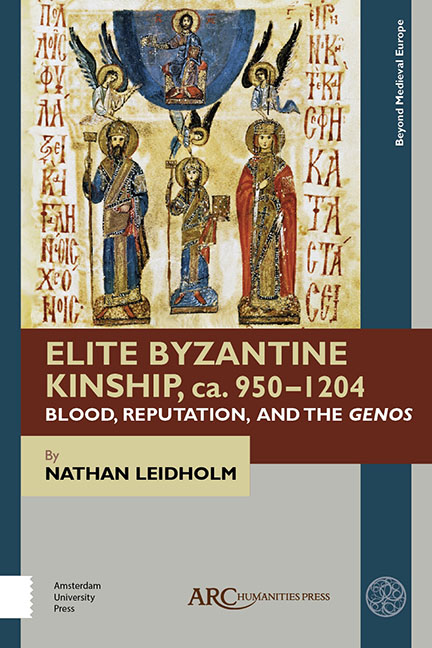Book contents
- Fronrtmatter
- Contents
- List of Abbreviations
- Abbreviation
- Acknowledgements
- Introduction
- Chapter 1 Defining “the Family” in Byzantine Sources and the Modern Historiography
- Chapter 2 The Language of Kinship
- Chapter 3 Marriage Impediments and the Concept of Family
- Chapter 4 Interrogating Consanguinity in a Byzantine Context
- Chapter 5 Family Names and the Politics of Reputation
- Chapter 6 Kinship and Political Developments of the Eleventh and Twelfth Centuries
- Conclusion
- Select Bibliography
- Index
Chapter 1 - Defining “the Family” in Byzantine Sources and the Modern Historiography
Published online by Cambridge University Press: 20 November 2020
- Fronrtmatter
- Contents
- List of Abbreviations
- Abbreviation
- Acknowledgements
- Introduction
- Chapter 1 Defining “the Family” in Byzantine Sources and the Modern Historiography
- Chapter 2 The Language of Kinship
- Chapter 3 Marriage Impediments and the Concept of Family
- Chapter 4 Interrogating Consanguinity in a Byzantine Context
- Chapter 5 Family Names and the Politics of Reputation
- Chapter 6 Kinship and Political Developments of the Eleventh and Twelfth Centuries
- Conclusion
- Select Bibliography
- Index
Summary
Ἔοικϵν δὲ μήτϵ τὸ γένος μήτϵ τὸ ϵἶδος ἁπƛῶς ƛέγϵσθαι.
It seems that neither genos nor species is so called simply.
Porphyry of Tyre, Isagoge 1.1.IN THE PREFACE to the collection Approaches to the Byzantine Family, Leslie Brubaker cites an oft-quoted passage from the Oxford Dictionary of Byzantium's entry on the family. “Although the family was the fundamental unit of Byzantine society, there was no specific word for it in Byzantine Greek: the most common term syngeneia designated both the nuclear family and kinship in general.” The Byzantines, however, lacked a single word to designate “the family” only because they had several.
In addition to syggeneia (συγγένϵια), terms designating the household (most commonly referred to as the oikos) are extremely prevalent throughout Byzantine history. The same is true for collective references to groups of relatives in a broader, albeit vague, grouping (e.g. syggeneis). Yet when speaking of the aristocratic family in Byzantium, especially from the tenth century onward, one term in particular stands out, both for its importance in elite society and politics in the period and for its prominence in surviving sources. That term is the genos (τὸ γένος, pl. genē/ γένη).
Modern lexica offer many generalized definitions for the ancient and medieval Greek genos, including “family,” “clan,” “house,” and even “race” or “offspring,” reflecting the multiple uses to which the term was put. In a medieval Byzantine context, the genos was the most common expression of the consanguineous family. The term would eventually denote a much more specific and carefully defined form of aristocratic kin group, which came to dominate social and political relations among the Byzantine elite by the end of the eleventh century.
It is commonly accepted that the genos formed a fundamental element of individual and group identity in Byzantium, particularly among the aristocracy. It was inextricably linked to the concept of noble birth, eugeneia (ϵὐγένϵια), which appears in the sources with increasing frequency from the late tenth century onwards. The genos also formed one of the basic building blocks of political factions in the same period as such factions were increasingly based around familial alliances forged through aristocratic intermarriage.
- Type
- Chapter
- Information
- Elite Byzantine Kinship, ca. 950–1204Blood, Reputation, and the Genos, pp. 13 - 36Publisher: Amsterdam University PressPrint publication year: 2019

